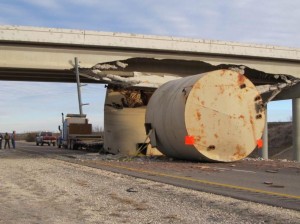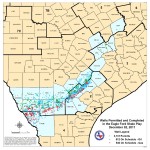Why the Legislature May Target Drillers’ Overweight Trucks

TxDOT
Truck hauling tanks in Midland/Odessa hits and damages overpass
Looking for ways to pay to rebuild roads damaged by thousands of trucks servicing oil and gas drilling, the Texas legislature will likely consider raising fees for overweight trucks when it convenes in January.
“The fees we are collecting today just are not sufficient to compensate for the increased consumption of pavement and bridges,” John Barton, Assistant Executive Director for Engineering Operations with the Texas Department of Transportation (TxDOT), tells StateImpact Texas.
‘Completely Destroyed’
Consumption is one way to put it. Destroyed is another.
“With all the traffic, it’s destroying our roads. Some are already completely destroyed,” says Frio County Judge Carlos Garcia in South Texas. It’s in the heart of the Eagle Ford Shale formation, where oil production from hydraulic fracturing, or “fracking,” in nearby Karnes County now leads the state.
But roads and bridges in the region are being worn out and damaged by thousands of trucks hauling sand, water, chemicals and equipment to do the fracking, the process that is revolutionizing the industry in Texas and other oil and gas states.
Earlier this year, the Texas Highway Patrol set up an inspection station in Dimmit County. It found that of 215 trucks inspected, 69 percent had equipment or driver safety violations serious enough to put the trucks out-of-service. That compares to statewide average of 25 percent, according to the Highway Patrol.

Dave Fehlng/StateImpact Texas
Repairing road in DeWitt County where heavy trucks make thousands of trips to drilling sites
“They’re not all overweight,” says TxDOT’s Barton, who explains that the issue isn’t so much compliance in paying the fees, but rather how much the fees should be.
“What we’re finding is we’re not collecting the appropriate fees from these overweight vehicles,” he says.
How to Modify the Fees
What would be more appropriate? The University of Texas Center for Transportation Research now has a study due out later this month that will be reviewed by Texas Transportation Commission then forwarded to the legislature. Known as the Rider 36 Study, its aim is to help determine how to modify the fee structure for operating overweight trucks.
Fees per truck can vary widely, based on weight, width of the load, and route traveled.
“Some are going to be as simple as a couple hundred bucks, and some will be as expensive as thousands of dollars,” says John Esparza, president of the Texas Motor Transportation Association, a trucking industry group.

TxDOT
New inspection station in Eagle Ford region
Truckers paid nearly $147 million in overweight permit fees in the past year, a big increase from the $98 million paid just five years, ago according to state data. By comparison, the state’s estimate for the road damage being done annually by increased truck traffic statewide is $2 billion.
The trucking association’s Esparza said the industry wants to pay its fair share, but as he tells StateImpact Texas, “We’re talking about an awful lot of money, and it’s not going to just be trucking where that money is going to come from.”

